Top News

July 27, 2013 Ryukyu Shimpo
The Center for the Study of Peace and Reconciliation held a symposium on July 20 at Hitotsubashi University on post-traumatic stress disorder (PTSD) issues among Battle of Okinawa survivors.
Psychiatrist Ryoji Arizuka and Tsuyoshi Kitamura, assistant professor of the Institute for Ryukyuan and Okinawa Studies at Waseda University, gave presentations.
Arizuka, who has clinical experience in Okinawa, said elderly Okinawa residents who experienced the Battle of Okinawa are likely to suffer from the disorder. He introduced cases in which Battle of Okinawa survivors suffer from depression and insomnia in older age. Arizuka said, “A lack of mental health care under the U.S. occupation after the war and the base issues, including noise caused by the military aircraft, contribute to the disorder.” He went on to say, “This rubs salt into the mental wounds, making it difficult for them to recover.”
Arizuka discussed the impact of the disorder over generations. The disorder makes it difficult for the sufferers to care for their children and to give enough love to them. Arizuka said, “In Okinawa the war caused a chronic neglect of children, the elderly and people with disabilities.”
Arizsuka currently works supporting those affected by the Great East Japan Earthquake. He said, “The victims suffer from the same type of late-onset disorder common in Okinawa,” and pointed out the need for mental health care.
Kitamura said that a lack of medical care after the war contributed to the development of the disorder and suggested that it is important to highlight this issue that society has failed to notice.
Go to Japanese
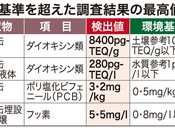
August 1, 2013 Ryukyu Shimpo
The Okinawa Defense Bureau detected dioxin and other harmful ingredients inside the barrels found at a soccer ground on land returned by the U.S. military in Okinawa City. The levels found exceeded the Environmental Quality Standard set by the Japanese government.
The Okinawa City Government released the results of their investigation on July 31.
They detected dioxin in fouling material at a level 8.4 times the normal standard for soil, and in the water it was 280 times the standard for groundwater. They found the key ingredient of Agent Orange in the barrels. The city government asked Nansei Environment Laboratory Co. to carry out the investigation.
The company said the barrels possibly contained Agent Orange because they bear the logo of the Dow Chemical Company, the United States based chemical manufacturer that produced Agent Orange during the Vietnam War.
The city government explained the results to the central and prefectural governments and city assembly on July 31.
That afternoon, the assembly held a meeting of its special committee investigating U.S. military base issues. The committee unanimously adopted a statement in which they asked the Japanese government to carry out a full-scale investigation and restore land returned by the U.S. military to its proper state. A special session of the assembly adopted the statement on August 5. The bureau found the key ingredient of Agent Orange–2, 4, 5-T, trichlorophenoxyacetic acid, in 18 of the 22 analytes from the barrels. They did not detect the other key ingredient of the defoliant–2, 4-dichlorophenoxyacetic. The bureau detected polychlorinated biphenyls in 11 of the 22 analytes. The highest value was 3.2 milligrams per kilogram at a level 6.4 times the standard.
The Nansei Environment Laboratory Co.’s report indicated that the composition of the dioxins in the barrels is related to Pentachlorophenol found in pesticides and herbicides. Levels of arsenic and fluorine found were slightly higher than the standard. The company suggested that harmful substances, including Agent Orange caused the pollution of the soil and groundwater at the site.
Of the 22 analytes from the barrels, two exceeded the normal standard for soil. The highest value was 8,400 picograms TEQ per gram. The level of dioxin in the water around the soil was 280 picograms TEQ per liter. The bureau found a large quantity of 2, 3, 7, 8-tetrachlorodibenzo, an ingredient unique to the defoliant. It is possible that the barrels contained dioxin related to Agent Orange because the ingredient accounted for 70 percent of the chemical.
Levels of dioxins found in the surface layer of the ground, surplus soil and the soil of land returned by the U.S. military in what was Camp Lester were substantially lower than the standard.
The bureau found 340 picograms of dioxin TEQ per gram, which is lower than the standard in the soil. However, it is higher than the level that requires caution: 250 picograms TEQ per gram.
Go to Japanese
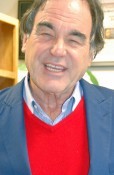
August 4, 2013 Ryota Shimabukuro of Ryukyu Shimpo
In his interview with the Ryukyu Shimpo, referring to the issue of U.S. military bases on Okinawa, film director Oliver Stone suggested that people should raise their voices to change the situation. Looking back on U.S. diplomatic history, he said that there have been some major turning points, such as the end of the Cold War, that lead towards disarmament. Stone said that as a result of people’s ongoing demands to reduce the unreasonable burden of the bases, “Everyone now knows of Okinawa.” He emphasized, “Okinawa, you have had an effect. You have stopped things from happening in Okinawa.”
(English translation by T&CT, Mark Ealey)
Governments cover up history
Shimabukuro: You and American University Professor Peter Kuznick created the documentary series “Oliver Stone’s Untold History of the United States” which focuses on the history of U.S. foreign policy including the development of nuclear weapons. What response have you had from people in the United States or abroad?
Oliver Stone: We did far better than we expected. For me, coming from bigger media and films, movies, I was disappointed by the media, the American media’s reaction to the series. I thought that they were dismissive and ignored it. They did not see it as a serious history. It’s hard because we are not known as big historians. I’m a filmmaker. They look at me as a filmmaker and here I am, coming on to history and taking it all on, and changing it, I mean, taking an upside-down view and saying – This is American history, but what you learned in school is all screwed up. And, I switch it like this and say – Think about American history this way! It’s not easy for them to accept. But, let me just say, that when the series came out I have to say, honestly, that Peter was very encouraged by most of the historians. Most of the historians were very positive. We were very lucky to get Showtime, which is premium cable, to do this and we had good results, surprising results. They didn’t advertise much. They did not expect a big market and we got 1.1 million viewers a week, on average. The encouraging thing was that the series started and stayed and went higher at the end, which is very rare, because most television series drop-off. As a result, I was able to get a deal with Warner Brothers, which is a big company, to distribute the film on DVD, the full 12 hours, in October of this year. That’s a big deal.
We got more attention, more serious attention in England, and we did very well in England. We also showed there. So I was encouraged by the more intelligent approach of the English Media, and that includes the more conservative papers like the Telegraph and The Times, and that The Guardian was very good. The book sales in Japan were very good. Premium cable and NHK, smaller stations. It wasn’t the best or the widest show. It was late at night and they cut ten minutes or nine minutes out of each episode, but given the limitations, we did very well in Japan.
Q: How do you see the history of the United States when looking from the standpoint of foreign countries and their histories?
Oliver Stone: Well, everything changes. Once you get into this history . . . You see, the reason I made The History, was because I knew that what I learned in school was not entirely true. That, like with every country, like with Japan, history gets covered up.
So, the atomic bombing of Japan, as with many other stories, in American history becomes a good thing, something that ends the war. And when you investigate it thoroughly, it was an unnecessary bombing, not only strategically, but morally repulsive. It puts my country in a very poor light. This is an issue, which bothers me no end. I was born in 1946. The bomb was always un-discussed. It was the right thing to do. It ended World War II. And, when you understand that the [fear of] Russian invasion of Japan played a significant role, perhaps the determinate role in Japan surrendering, it changes the entire equation, and you begin to look at the Soviet Union-U.S. rivalry, the Cold War, so to speak, as started by the U.S. right then and there in Japan. You see? Which I think is something that we don’t even deal with in this country.
Some revisionist historians at college level do deal with it, but not at high school level. Not at the high school level. So, we have a “national myth.” The U.S. won World War II. The U.S. had to use the atomic bomb to end the war. These are two myths that we try to shatter. That is at the very beginning of the series. This is the kind of problem you have.
This is the kind of problem you have. But, we go all the way through Reagan, Bush, Obama, Eisenhower. We believe that this is what America has become. We have become a super fortress, a global security state, not a national security state but a global security state, with an empire unlike any in history; one that controls the world. Most recently in the asylum seeking of Edward Snowden, you see the United States again, exerting its will on every country in the world, to stop this man and not to let him fly into another country, not to seek asylum.
This is an amazing, amazing act of control. It shows you the control the United States exerts, especially in Europe, which is very . . . Except in South America, which is interesting, because in the old days, when I grew up, South America was under America’s thumb and Europe was independent. Now, unfortunately, Europe is under America’s thumb.
Q: About 200,000 people lost their lives in the Battle of Okinawa during World War II. U.S. military bases in Japan are concentrated in Okinawa after the war. You are visiting Okinawa for the first time. What impression do you have of Okinawa?
Oliver Stone: It is clear to me now, that the United States has truly a unilateral relationship with Okinawa. The United States is more interested in keeping Okinawa probably that even the Japanese bases. It fits right into the U.S. global strategy of controlling all sea-lanes, controlling China, the “pivot to China.”
I don’t really think the United States cares about that Okinawa belongs to Japan or not, and that’s another issue, but I really think the United States only cares about its relationship with Okinawa, because they wanted to use it like Guam. They want to use it like Pearl Harbor. And, Japan doesn’t care either. I don’t think Japan cares about Okinawa. Okinawa cares about Okinawa. I mean, Japan would say – Okay, you want to? all the bases on Okinawa? Fine!
Most Americans still see Okinawa simply as a battlefield in World War II, where the United States people lost a lot of soldiers and the Japanese were fanatical in resisting, but that it was a glorious battle, and we won. I don’t think that they even know that there is a difference between the Okinawan people and the Japanese people, and they certainly do not know that Okinawa was an independent kingdom before, it was 1879, and that Japan occupied them. Okinawa is truly, I guess you would call it a Polynesian Island. I don’t know what you would call it, but it certainly exists in the same realm as Guam or the Philippines or Hawaii, all of which have been treated pretty badly by the United States and by the Japanese.
So, I’m going to Jeju Island also, in my trip. So it’s ironic, because I hadn’t planned it that way, but Jeju was added at the last second, and it’s similar to Okinawa, because it’s an island and they are being threatened by a huge development, this naval base being built, supposedly by the South Koreans, but really being done for the use of the United States on Jeju. They’re going to destroy the coral reef. They are going to use the biggest, deepest naval carriers in the fleet. The George Washington would be able to sail into Jeju, which means the end of the coral reef there, in that part of the island.
The relationship between Okinawa and U.S. – a double standard
Q: The United States advocates freedom, equality, and democracy based on the spirit of the Constitution and founding principles, but people in Okinawa live in a contradictory world.
Oliver Stone: It’s definitely a double standard and part of the reason that we made The Untold History was to point out some of these contradictions. It’s very hard for me to accept that the American people just go along with this, because they’re comfortable, because the empire justifies itself. They don’t think about the costs to them, of this empire, that we pay these taxes. In fact, on Okinawa the situation is that the United States has a “sweetheart deal” because they get Japan to pay most of the money for Okinawan maintenance, which is interesting. We have the best deal of all in Okinawa. Japan pays most of these costs. On top of that, our Status of Forces Agreement allows us to maintain independence inside Okinawa. We have no responsibility beyond the judgment of our own military courts. That was the reason why we had to pull out of Iraq, according to many people, was because Iraq would not recognize the Status of Forces Agreement with the United States. And, the United States is terrified of being judged by an international tribunal, and I think it shows you that we are basically scared of being judge wrongly, and scared of our own actions.
Q: You referred to the arms race of the Cold War era in Oliver Stone’s Untold History of the United States. How do you see China’s rising presence? Some people use this as an excuse to maintain the U.S. bases in Okinawa.
Oliver Stone: China certainly has a right to flex its muscles, but you know, unfortunately if you try to keep China down and say – You can’t flex your muscles . . . we’re going to have problems. I think you have to let a baby giant… you have to let it grow. China will have its own set of problems, but I don’t see China as the enemy. I see China as very smart, but I do think that they have some inherent problems. They’re not exactly a democracy. They have party-control issues. But, we have to get along. The world needs to be multi-polar. The United States cannot be the dominant power any longer.
This is a big issue, because, if you are number-one you don’t want to give up the position. That’s the mentality of capitalism. You’re number-one. See, no one in the United States ever asked – Why do we have to be in this race for arms all over the world? And, with the Soviet Union collapsing in 1991, that was a key moment to ask that question, but the United States never even thought about it and pursued its policy of hegemony all over the world and maintained this pace of military spending, as well as expanding the bases.
Everyone now knows of Okinawa
Q: There have been moves by which the people seek change, which were reflected in election results and government’s policy, both in Japan and in the United States. However, the leaders cannot keep their promises. Former Prime Minister Hatoyama failed to achieve his pledge to move Futenma Air Station outside of Okinawa.
Oliver Stone: This is where I think mass movements played a huge role. I mean, people matter. Mass movements give leaders backbone to fight. Certainly, Franklin Roosevelt felt the population was behind him and that was why he was able to legislate very authoritatively, to tell the bankers that they can should give up. It takes guts, because the banks run the world. He did it. Henry Wallace. John Kennedy. John Kennedy was always aware of political opinion. He was very much a politician, but he felt like he knew he was going to win the 1964 election. He knew it. He felt it. He felt like – I can do many of these things I want to do in 1964. I may not be popular, but I can do that after I get re-elected. He was the best chance we had after World War II, to really change things, and he was killed before the election, and I think that’s part of the reason he was killed. Obama I think is very much the same case. I think Obama, again, was a candidate for great change and hope and somewhere, as we showed in Chapter 10 of our documentary, somewhere along the line he lost his way. By the time he became the president, after he had been elected, Wall Street, pharmaceutical companies, computer companies were financing him instead of the people. His deals with Wall Street were somehow in place, very little reform. On the War on Terror – nothing. Minor, softer language, better management than Bush, but essentially transparency was not brought to government and no responsibility was brought to the eavesdropping and Snowden affair, et cetera. On the contrary, Obama has been harder on whistleblowers, harder on people who were trying to expose war crimes. So, this is where mass movements are important. Obama knows in his gut, that the people, some people on the left and right have had enough. I think to some degree that moderates his behavior.
But, there is no question that mass pressure is important. During the Vietnam War, Richard Nixon wanted to bomb of the North even more. He wanted to bomb Cambodia. He bombed enormously, but I think the protests, to some degree, curbed his appetite, and to some degree made the peace agreement possible in 1973. But Nixon was an extreme example of a leader who just did not pay attention to people.
That’s very hard. Ronald Reagan paid more attention, because he was a war candidate. He wanted to really destroy the “Evil Empire,” but the protests, the nuclear protests in 1983 in New York and all around the country against what people felt was the coming of a new war, had a lot to do with Reagan starting to change. He softened. When Gorbachev came along, which was lucky for him, Reagan found himself in a completely opposite position of becoming a peacemaker. So the protests, the Nuclear Freeze Movement of 1983 did pay off.
And Occupy, to some degree, expressed our disgust with bankers. We mustn’t let up. We hope our series will be one of these things that will educate people. Who knows? The children, the young people who are seeing our TV series, maybe one of them is going to see it and be moved, or more than one, and maybe one of those people is going to be a Martin Luther King or a Robert Kennedy or a Jack Kennedy, and maybe it will make a difference. Education is the only way. Consciousness is the only way to defeat this darkness of imperial power and domination. Okinawans keep marching. In Jeju, every day the Koreans…. This is a very tough government in Jeju, probably tougher than the Japanese Government. There are very tough. The arrest people and they beat them with sticks and put them in jail. These people have been protesting on Jeju Island for six years. Now, the naval base is still being dealt. You know, I’m going there and other people go. I mean, you hope with a little bit of water that suddenly the dam cracks, yeah? A little bit of water…. Okinawa, you guys have had an effect. You have stopped things from happening in Okinawa. You are a small population, but you get it. You are heard. Everyone now knows of Okinawa. Be very clear about what you mean, saying – We don’t really want to be part of Japan and certainly not part of the United States. Be very clear that – We are islanders! We are not part of Japan! Be very clear in that message.
It would be great if you had a good leader, somebody like a Nelson Mandela or Martin Luther King, who could clarify very clearly for the American people and the European people what it is that upsets you. I believe in the Gandhi and Martin Luther King principle of satyagraha, nonviolence. That’s not to say “passive.” Believe me, when you’re going out there and you link arms and you get arrested and beaten, it’s not passive. It’s very much active, active resistance, but nonviolent.
Go to Japanese
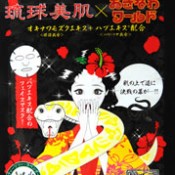
July 25, 2013, Ryukyu Shimpo
The Uruma-Bio Co. based in Uruma and Okinawa World in Nanjo have developed a cosmetics facial mask sheet that uses the extract of the habu (pit viper). The mask sheet is available from July 24 at Okinawa World and in hotels and gift shops in the prefecture. Uruma-Bio manufactures and sells nutritional supplements and Okinawa World is a tourist facility run by the Nanto Co. Representatives from both companies announced the new product at a press conference held on July 24 at the Okinawa Prefectural Government Office. They say that the habu extract gives facial skin a natural luster, tension and glow and that it also has a moisturizing effect. They have added a natural aroma blended from lavender and tea tree oil to bring out the pleasant smell of the forest and to tone down the image of poisonous snakes.
Okinawa World, which runs a habu museum and park, has experience running projects that involve snakes, including a habu-show. Ko Takahashi, the manager of the park said, “This product will also serve to help promote local industry.” The facial mask sheet is the sixth item in the cosmetics series, “Ryukyu-Bihada” (Ryukyu beautiful skin) released by Uruma-Bio. This is the second time that the company has jointly produced items with a business partner in Okinawa. Uruma-Bio has sold about 620,000 units of “Ryukyu-Bihada” since 2010.
One facial mask sheet sells for 399 yen including tax. The company aims to sell about 200,000 sheets in the first fiscal year.
(English translation by T&CT, Mark Ealey)
Go to Japanese
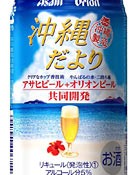
July 18, 2013 Ryukyu Shimpo
Orion Breweries and Asahi Breweries held a press conference at the Tokyo Chamber of Commerce and Industry Hall in Marunouchi, Chiyoda, Tokyo on July 17. They announced that they will sell their new jointly-developed product “Asahi Orion Okinawa-dayori” from July 23 throughout Japan except Okinawa Prefecture and the Amami District. This is the first product in their business alliance.
The companies started developing the product as third-category beer two years ago. Their aim is to have consumers outside Okinawa enjoy the atmosphere and feel of Okinawa. The combination of Asahi Breweries’ technology bringing out the flavor of clear hops and Orion Breweries’ two-stage filtration brewing produces a refreshing taste and a spectacular aroma.
Brewing will take place at Orion Breweries’ Nago Factory. The companies use “Yambaru water,” which is soft water suited for making beer. In the press conference, Orion Breweries’ Managing Director Seiichi Miyazato said, “We have created a product that allows people to enjoy the feel of the Okinawan summer.”
The retail price at convenience stores will be 147 yen, tax inclusive (350 milliliters). They aim to sell 50 thousand cases (one case = about 20 large bottles) within the year.
(English translation by T&CT, Lima Tokumori and Mark Ealey)
Go to Japanese
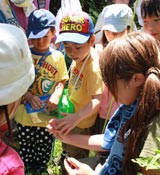
July 24, 2012 Ryukyu Shimpo
About 200 parents and children took part in an insect observation session at Takae in Higashi Village on July 21.
A member of the Lepidopterological Society of Japan’s Nature Conservation Committee, Akino Miyagi, gave a lecture. The participants enjoyed seeing and collecting insects such as butterflies and stag beetles that live in Takae.
They saw colorful and beautiful insects such as Papilio helenus butterflies, common bluebottles and Orthetrum albistylum speciosum upstream on the Arakawa River. Children caught butterflies with nets. Handling the likes of Dorcus titanus okinawanus and click beetles that Miyagi had caught, they enjoyed their excursion into the nature of Takae.
Four-year-old Ko Kedamori said, “I caught a yellow butterfly when it was moving.”
Miyagi said, “Opportunities for children to engage with nature are on the decline. Another reason why we need to preserve our natural environment is so children can have those opportunities.” She went on to say, “Red soil runoff from building the U.S. military helipads could affect all of the natural environment at Takae, not just specific areas.”
(English translation by T&CT, Mark Ealey)
Go to Japanese
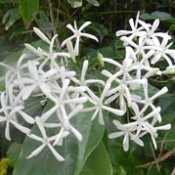
July 24, 2013 Ryukyu Shimpo
With the rainy season having finished, pure white flowers are in full bloom in the northern area of Okinawa. Their outstanding beauty captivates people in the lead-up to midsummer.
Tarenna gracilipes are found from the southern area of Kyushu down to Okinawa and Taiwan. It has five straight petals, each about one centimeter in length. People compare the beauty of the petals to that of a woman’s lips.
The petals of Clematis meyeniana form a cross shape. This flower is found from Southeast Asia to Okinawa. People compare the white hairs growing from its seeds to facial hair of mountain hermits. Regardless of its beauty, people should be careful about the flower because its seeds and leaves are poisonous.

Clematis meyeniana in the northern of Okinawa. Its petals form a cross shape.
(English translation by T&CT, Mark Ealey)
Go to Japanese
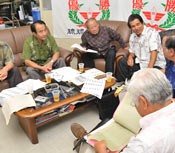
July 18, 2013 Ryukyu Shimpo
The Okinawa Bullfighting Federation held discussions at the Chubu Branch Office of the Ryukyu Shimpo on July 13 about publishing a book to commemorate the 50th anniversary of its establishment. Those present looked back on the famous fighting bulls and their best bouts, including the first Yukari-go, which recorded 41 consecutive wins. They discussed how to promote bullfighting for tourism, and how to maintain its traditions. The federation will release the book on November 10, the day that the 100th All Okinawa Togyu (Bullfighting) Autumn Tournament will be held at the Ishikawa Multipurpose Dome.
Seven people took part in the meeting including Masakazu Kochi, president of the federation, Morisaki Iju, chief editor of the book, Masahide Uehara, former bullfighting commentator, and representatives from the regional bullfighting unions.
They talked about famous bulls such as Ishikawa Chinushirua, which was known for being a hugely skilled fighter, and Uken Toramuku, the first champion at 1st All Okinawa Togyu Tournament held in 1962. Morisaki Iju spoke highly of Yukari-go and said that it was like a sumo wrestler Taiho. They suggested that bullfighting should become a vibrant aspect of tourism in Okinawa to attract visitors from other prefectures. At the same time, they face the challenge of increasing number of bulls and bull owners. The book will include articles from the Ryukyu Shimpo, which has co-sponsored All Okinawa Togyu Tournament since its inception. It will also feature an article on the recent discussion and the history of Okinawan bullfighting.
(English translation by T&CT, Hitomi Shinzato and Mark Ealey)
Go to Japanese
July 19 2013, Ryukyu Shimpo
The period for public inspection of the application documents submitted by the Okinawa Defense Bureau to reclaim land off Henoko, Nago ended on July 18. The bureau submitted the application to the Okinawa governor for permission to carry out the landfill necessary to build a replacement base for U.S. Marine Corps Air Station Futenma. According to the Okinawa Prefectural Government (OPG), it has received over 2,000 written opinions from residents during the three weeks available for public inspection. An OPG official said, “It is probably the largest number of written opinions we have received on landfill projects in Okinawa.” This highlights public concern over the issue of the landfill at Henoko.
Because the Public Water Body Reclamation Act does not specify who the interested parties are that can submit a written opinion, the OPG indicated that it would also accept them from people living in other prefectures. Kenichiro Tome, the director of civil engineering and construction in the OPG, said, “First of all, we will confirm what opinions came from what people, and then we will decide if they are interested parties or not.”
The OPG is reviewing the content of the written opinions and who sent them next week to judge if they are interested parties or not. The OPG will examine the site for the landfill in mid-August. In addition to reviewing the application, the OPG will ask for opinions from the related departments of the OPG, including the Agriculture, Fisheries and Living Environment Section, the Nago City Office and the Japan Coast Guard.
On July 18, the closing day for public inspection of the application documents, environmental groups, and citizens’ groups visited the OPG office to submit written opinions. Co-representative of the Ramsar Network Japan, Shinichi Hanawa, said, “Usually residents wake up to what is happening after the period for the application documents to be available for public inspection has ended. People normally only notice once the construction has started. That this many written opinions came in from residents is rare for any part of Japan.”
(English translation by T&CT, Mark Ealey)
Go to Japanese
July 25 2013, Ryukyu Shimpo
A DNA test carried out by the Ministry of Health, Labor and Welfare has identified remains found at Makabi, Naha, as those of a soldier from Tokyo killed in the Battle of Okinawa. The Ministry revealed this on July 24. It has conducted DNA analysis of remains of war dead since 2003. This is the second case in which DNA testing has identified such remains. The Japanese soldier was a member of an artillery platoon attached to the 15th Independent Mixed Regiment. The ministry has withheld the man’s identity in keeping with the wishes of the bereaved family.
The bones were found during road construction work in March 2010. The volunteer group Gamafuya, which has worked collecting remains of war dead, searched for the man’s family through newspapers in other prefectures but was unable to gain any information. The DNA test proved crucial in finding the bereaved family.
The ministry identified the dead artilleryman by comparing his DNA to that of his family. President of Gamafuya, Takamatsu Gushiken, was critical of the slow response of the ministry. He said, “As many as 200,000 people died in the Battle of Okinawa but only two bereaved families have been located using DNA testing.” He suggested that the government should create a database for the bereaved families by carrying out DNA tests for all who request one. Gushiken said, “Using such a database, the government would be able to quickly match remains to bereaved families.”
(English translation by T&CT, Mark Ealey)
Go to Japanese
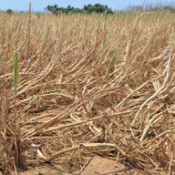
July 20, 2013
The lack of rain in Okinawa has begun to damage crops such as sugarcane and leafy vegetables. Ongoing hot weather in other areas of Japan has seen the price of vegetables from outside Okinawa rise. The Okinawa Meteorological Observatory expects rainfall to continue to decline for some time yet and fears that damage may become more extensive.
According to the municipalities and the Japan Agricultural Cooperatives in Okinawa, there has been leaf rolling on sugarcane throughout the prefecture, but especially in the Miyako and Yaeyama areas that were hit by Typhoon Soulik. The water shortage has hurt the crops. Some municipalities have lent spray pumps to farmers and are considering starting irrigation work from next week.
Seventy-five-year-old Tatsuichi Taira who grows vegetables on about 5,000 square meters of fields in Toyohara, Itoman, said, “The well dried up because of the drought, so all the vegetables have died. There is nothing I can do about it.”
With rainfall expected to continue to decline, many municipalities fear that the extent of the damage will worsen. Miyako City, which suffered serious damage from salt pollution from the typhoon, held a meeting to deal with the drought and decided to offer irrigation for farming households.
Ishigaki Island suffered great damage after a storm without rain swept through its sugarcane fields. Ishigaki sugarcane farmer Toshiichi Yokome said, “Crop yields will drop. We have never seen damage like this before.” The Okinawa Meteorological Observatory said that the Pacific anticyclone will cover Okinawa area and that the weather will clear up from July 20 to 26. It expects less rainfall this year than usual. It will be clear most days in the first two weeks of the period from July 20 to August 19, with little rain expected.
(English translation by T&CT, Megumi Chibana and Mark Ealey)
Go to Japanese










 Webcam(Kokusai Street)
Webcam(Kokusai Street)


